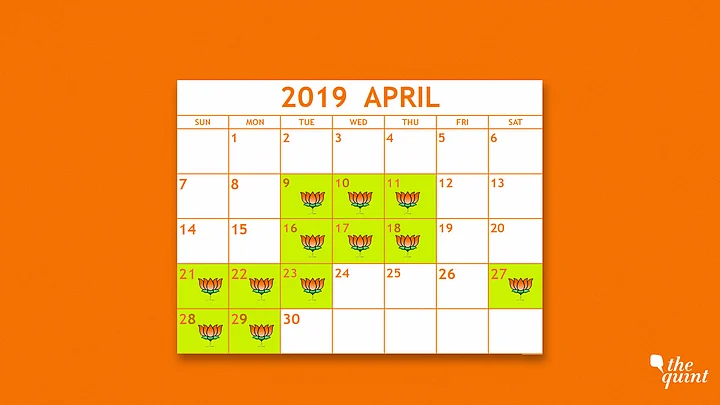The Bharatiya Janata Party is said to have violated the mandatory 48-hour silence period leading to and during each of the four phases of polling thus far in the Lok Sabha Elections.
The BJP, identical to its behaviour in the third phase, had 600 active Facebook ads running even as polling was underway in phase 4 on 29 April. All the ads were targeted at one or, in most cases, multiple states -- like West Bengal, Maharashtra, Madhya Pradesh, Rajasthan -- which went to polls on Monday.
The consistently brazen violation of the 48-hour ‘silence period’ has exposed the toothless nature and abject failure of the Code of Ethics for the elections that social media platforms like Facebook had submitted to the EC.
According to this voluntary code, the EC would have a priority channel with social media platforms, specifically to remove advertisements on social media that violate the 48-hour silence period.
As per Facebook’s latest Political Ads Report, the BJP emerged as the highest weekly spender yet again with Rs 1.23 crore spent on 608 ads between 21 and 27 April.
Moreover, of the total Rs 2.61 crore that the BJP has spent overall on Facebook ads since February, it has spent Rs 2.18 crore between just 7 and 29 April alone. All the four election phases - 11, 18, 23 and 29 April - have been conducted within this period.
The ads, most of which are short videos with PM Narendra Modi’s image, consist of a variety of promises that the party made in its manifesto. However, neither has the EC taken any action on the advertisements, nor has it responded to The Quint’s questions on the same.
What the 48-Hour Silence Period Says
Section 126 (1) of the Representation of the People Act, 1951, clearly states that “no person shall display to the public any election matter by means of cinematograph, television or other similar apparatus in any polling area during the period of forty-eight hours ending with the hour fixed for the conclusion of the poll for any election in that polling area.”
During this period, no individual is allowed to propagate or display to the public any election-related content. While this provision has been implemented offline, it appears to have been brazenly flouted in the online space.
600 BJP Ads Running on Facebook During Phase 4
The silence period for phase 4 commenced at 5 pm on Saturday, 27 April, and will be in place till end of polling on Monday, 29 April.
However, despite this ban on advertisement during this period, of the 600 active ads as on Monday, the BJP started running 185 ads on Sunday, 28 April, when the silence period was firmly in place. All the ads were found to be running throughout Monday while voting was underway in 72 constituencies across nine states.
This violation during phase 4 comes just six days after an identical violation during phase 3 polls. On 23 April, as over 18 crore Indians went to polls in over 2 lakh booths across 117 constituencies spread over 14 states and Union territories in phase 3 of Lok Sabha elections, the BJP ran 600 ads on Facebook targeted at those voting today.
A look at the spending patterns over the last three weeks reveals the BJP’s growing footprint across Facebook’s digital advertisement space.
- 7 - 13 April: Rs 51 lakh
- 14 - 20 April: Rs 45 Lakh
- 21 - 27 April : Rs 1.23 Crore
The Abject Failure of EC’s Social Media ‘Code of Ethics’
On 20 March, social media platforms, including Facebook, had voluntarily agreed to take down political advertisements during the mandated 48-hour “silence period” before and during each of the seven phases of polling.
This, however, has not happened in any of the four phases of polling so far. The question is, why, despite this mechanism in place, has the EC not alerted Facebook regarding any of these blatant violations ?
Seven social media giants – Facebook, Google, WhatsApp, Twitter, Sharechat, TikTok and BigoTV – had signed an eight-point Code Of Ethics for the General Elections 2019 and presented it to Chief Election Commissioner Sunil Arora.
So, what is the objective of this code?
According to the document, the purpose is to “safeguard” the platforms “against misuse to vitiate the free and fair character” of the elections as well as to “identify measures” to “increase confidence in the electoral process”.
However, a perusal of the code of ethics and its provisions present a curious situation where the onus is on the Election Commission, and not Facebook.
Point 3 of the code says that a social media platform will act on violations of section 126 of the RP Act, provided it receives a valid legal request from the Election Commission for it. Therefore, the code says nothing about a social media platform acting on violations of its own accord.
The code further states that “These valid legal orders will be acknowledged and/or processed within three hours for violations reported under section 126 as per the Sinha Committee recommendations”.
In response to The Quint’s query about inaction, a Facebook spokesperson said, “As part of the industry effort, we have adopted the Voluntary Code of Ethics for the General Elections 2019 and have undertaken to establish a high priority communication channel with the nodal officers in ECI.
“We have also agreed to take action on content reported by the nodal officer, expeditiously, in accordance with the law.” the spokesperson added.
However, despite the Code of Ethics, Facebook appears to have taken no tangible action against silence period violating advertisements.
(The story was last updated at 9.50PM IST)
(At The Quint, we question everything. Play an active role in shaping our journalism by becoming a member today.)
